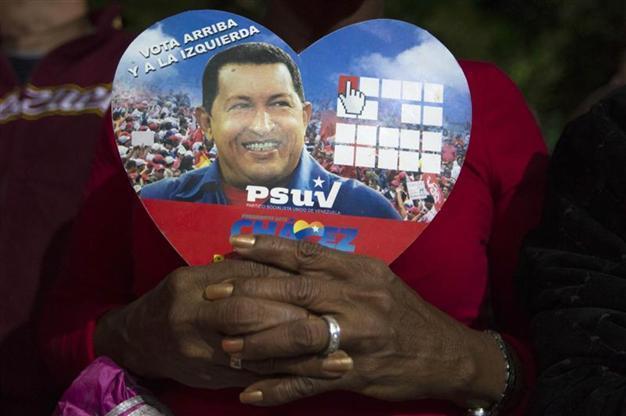Chavez getting stronger, entering 'new phase': VP
CARACAS - Agence France-Presse

A supporter of Venezuelan President Hugo Chavez holds a picture of him, as she attends a ceremony in Caracas December 31, 2012. REUTERS photo
Venezuelan President Hugo Chavez is "gaining strength" and entering a "new phase" of cancer treatment in Cuba, his anointed political heir said Sunday, as doubts about his health mount in Caracas.
Vice President
Nicolas Maduro said in a statement that the absent leader's "vital signs and organ function are stabilizing, he is conscious and gaining strength for the next stage." But Maduro's remarks did not go far to address speculation among
Venezuela's political foes that Chavez -- who has not spoken publicly since December 10 though he usually is ubiquitous in state media -- is unable to speak or dead.
Chavez designated Maduro as his deputy before flying to Cuba for a fourth round of cancer surgery on December 11. Opposition members have demanded Chavez speak to the Venezuelan people in state media if he is able, but he has not.
The last thing anyone who knows Chavez would believe him capable of is a long silence, his opponents contend.
The Venezuelan government has been releasing only minimal information on the condition of Chavez, a 58-year-old former paratrooper who first came to power in the oil-rich country in 1999 and won another six-year term last October.
Maduro said that Chavez is "finishing the post-operative period and will enter a new phase of treatment," following his surgery, but like his previous statements it lacked any specific prognosis from doctors.
The charismatic and bombastic figurehead of the region's anti-American left could not attend his scheduled inauguration on January 10 because of his poor health, and his swearing-in ceremony has been postponed indefinitely.
The Venezuelan government has only admitted Chavez suffered complications, including a severe pulmonary infection that led to "respiratory insufficiency." Aides and family members have had to tamp down speculation that Chavez might not make a full recovery. Almost six weeks after he left Venezuela, he is yet to be seen in public and remains, presumably, in a Havana hospital.
Speaking to private Venezuelan television network Televen, Maduro said he had spoken with Chavez on several occasions, including a hospital visit on January 14 when the president "was very interested in oil prices." Venezuela has the largest proven oil reserves in the world, which have allowed Chavez to project power across the region.
"We're always optimistic in the sense that sooner rather than later we will have the president here with us," Maduro said, adding that El Comandante was in good spirits and focused on his treatment.
Tensions are running high in Venezuela amid uncertainty over the future of Chavez, but for now the decision by the Supreme Court to allow the indefinite postponement of the inauguration is being respected.
Venezuela's opposition on Friday canceled a march planned for January 23. They said they feared Chavez's ruling party would "incite violence" with its own parallel mass demonstration.
Last week, the opposition seized on just a few words -- Chavez's stamped signature on a decree -- to demand he clarify how sick he is and what he can and cannot do.
The official government gazette published a decree dated Caracas and carrying the stamped signature of Chavez in which Elias Jaua was named as Venezuela's new foreign minister.
Henrique Capriles, a state governor whom Chavez beat in Venezuela's October presidential election, said it was puzzling that the decree carried the absent leader's name.
"If the president of the republic can sign decrees, I call on him to appear, and to speak to Venezuela and tell us what is happening in this government," Capriles said.
Officials have never disclosed the type or severity of Chavez's cancer, saying only that he has had a tumor removed from his pelvic region.
Before leaving Caracas, he urged his armed forces to be on the lookout for any attempt, "from outside or from within," to destabilize the OPEC member.
